Scaling up intervention for girls: Lessons learned from ENGINE II program
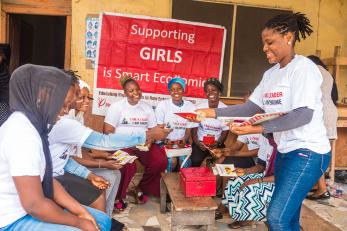
Introduction
In Nigeria, girls face several social, cultural and economic constraints to accessing quality education and economic opportunities. Making up 60% of 13.2 million out-of-school children in Nigeria, chances are even tougher for out-of-school girls, according to a statement by the Federal Government of Nigeria. At the top of the challenges is high poverty rates, illiteracy, limited access to finance and markets for income generation. These are often worsened by other issues such as early marriage and pregnancy, lack of life skills and vocational skills training, distance to school, poor school infrastructure facilities and inadequately trained teachers.
In cases where limited opportunities exist, girls experience additional constraints ranging from security concerns, lack of guidance and counseling, inadequate reproductive health education and services, lack of community support and conducive environment to gender inequalities and norms - in and outside classrooms that negatively affect their progress.
These constraints are further exacerbated by systemic weaknesses and a one-size-fits-all approach to resolve challenges that often differ from one state or community to the other, instead of utilizing a variety of solutions. It is on this backdrop that Mercy Corps implemented the Educating Nigerian Girls in New Enterprises (ENGINE) II program; to ensure that no girl was left behind.
About the ENGINE II Program
Educating Nigerian Girls in New Enterprises (ENGINE) II is a 3 1/2 year (April 2017 – October 2020) adolescent girls’ education program funded by the U.K. Foreign, Commonwealth & Development Office (FCDO), through its Girls’ Education Challenge (GEC) fund. ENGINE II was designed to address the barriers that limit marginalized girls’ access to education and business opportunities and to create an enabling environment for them to thrive.
Mercy Corps led the implementation of ENGINE II in Nigeria, along with four Civil Society Organizations including Society for Women Development and Empowerment of Nigeria (SWODEN) in Kano, Action Health Incorporated (AHI) in Lagos, Kindling Hope across Nations Initiative (KHAN) in Kaduna, and Tabitha Cumi Foundation (TCF) in the Federal Capital Territory.
The ENGINE II program recorded many successes in improving learning outcomes and enhancing economic opportunities for marginalized girls across the four states it was implemented - Kano, Kaduna, Lagos and the Federal Capital Territory.
Structured around three core outcomes of Learning, Transition and Sustainability, ENGINE II implemented an integrated approach to: 1) enhance learning experience, 2) increase income-generation and asset building skills, 3) enhance life skills training opportunities, 4) improve gatekeeper commitment and perception towards girl’s education, and 5) expand policies and practices benefitting adolescent girls and young women.
This brief documents the successes achieved by ENGINE interventions, showcasing various levels of impact on the lives of girls and gatekeepers who are strong influences to ensuring that the interventions were sustainable, particularly highlighting behavior change in real life. The stories cover the five outputs of the program and key program strategies that helped in sustaining stakeholders’ engagement, innovation and adaptive management for delivering opportunities towards improving the lives of marginalized in-school and out-of-school girls.
Transforming the lives of marginalized girls
Fatima is one of 1,362 marginalized girls supported to go back to school on the ENGINE program. Fatima dropped out of secondary school after she lost her father, however, upon her enrollment into the ENGINE program, she not only was able to return to school and pursue her studies, but also became an advocate promoting education in her community.
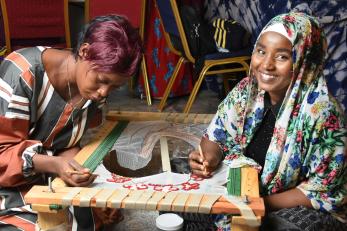
The intervention empowered young women not to be afraid to challenge the status quo. Results show girls delaying marriage to go to school, sharing life skill experiences with other girls as peer mentors, speaking up for their rights and leading actions that promote gender equality. 17-year-old Salma, after managing to delay her own marriage, became a girl leader promoting girls’ education and life skill training among her peers.
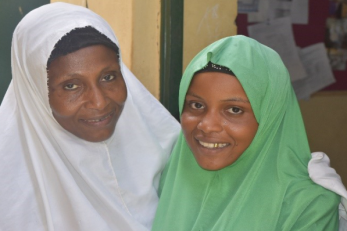
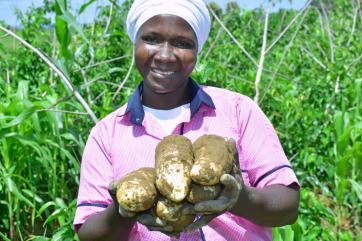
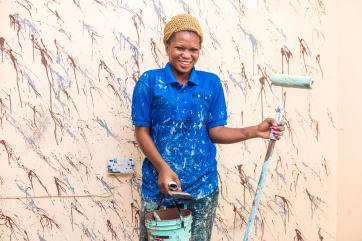
-
1,362
-
2,275
-
688
-
138
-
6,498
-
$47k
-
620
-
5,260
-
36
- Established partnerships with 190 local businesses to provide vocational training to 2,502 out-of-school girls and supported 1,051 to access financial services.
- Kano and Kaduna state governments adopted Child and Vulnerable Adult Protection (CVAP) Referral Protocol, School Code of Conduct and School Charters.
- 66 school development plans were developed by School-Based Management Committees which incorporated best practices against bullying, harassment, exploitation and abuse at school level.
Lessons from ENGINE II Program
- Targeting Young Women of Reproductive Age: We have observed that an education program targeting girls of reproductive age needs to have a strong component on sexual reproductive health to address emerging issues like unplanned pregnancies, sexually transmitted diseases, menstrual hygiene and access to health services.
- Formal education structures can strengthen informal education structures: engaging school head teachers from formal education structures as supervisors for out of school learning centers has enhanced the quality of mentoring received by learning center facilitators. Thereby influencing the quality of teaching and learning at learning centers.
- Incorporating SMART economic empowerment initiatives plays an important role in creating an enabling environment for marginalized girls to thrive and achieve learning outcomes. Sustained economic empowerment of girls is critical as most of them who want to go back to school also have families to fend for.
- Business expansion opportunities for cooperative groups. Equipment grants provided to cooperative groups empowered multiple program participants, increasing the impact of the intervention beyond an individual level.
This document details a summary of learnings and findings from the program and recommendations for scale up, approaches for implementation and sustainability of girl child education interventions.
Adapting to COVID‑19
To facilitate girls’ access to continuous learning during school closure due to the COVID‑19 pandemic, ENGINE organized virtual learning sessions held on WhatsApp, radio and SMS. Data from girls tracking conducted in February/March 2020, prior to the pandemic, revealed that 58% of program girls have access to mobile phones but about 23% have access to android phones that enables learning via WhatsApp. Most times, girls relied on the phones of parents or guardians to participate in lessons and others who do not have access to phones, were reached through their peers and trained facilitators. Hence, the program deployed teaching through radio to reach more girls including non-program participants.
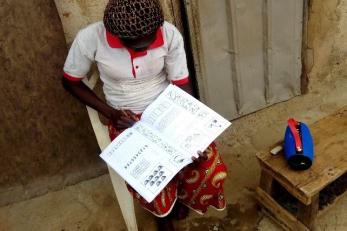
Mercy Corps appreciates the U.K. Foreign, Commonwealth & Development Office (FCDO), the Nigerian Ministry of Education and Women Affairs and their state level Ministries, Departments and Agencies (MDAs), the National Commission for Mass Literacy, Adult and Non-Formal Education (NMEC) and Agency for Mass Education (AME) who provided funding and structures through which over 18,000 girls improved their learning in literacy, numeracy, life skills and financial education. Mercy Corps welcomes the partnership with the Central Bank of Nigeria, Access Bank, National Identity Management Commission and numerous community-based Vocational Training Institutes who provided platforms for the girls, financial inclusion and skills building, which have contributed to the improvement of girls’ income.